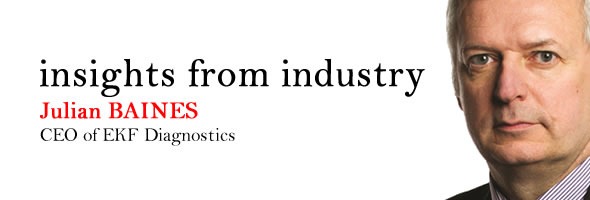
NICE have recently released some guidelines for diabetes prevention. Please could you tell us a little bit about this?
NICE public health guideline 38 ‘Preventing type 2 diabetes: Risk identification and interventions for individuals at high risk’ aims to identify people at high risk of type 2 diabetes and to offer cost effective and appropriate interventions to prevent or delay the onset of type 2 diabetes.
The guideline recommends a staged approach involving an initial risk assessment score and blood test followed by quality assured, evidence-based intensive lifestyle changes to prevent or delay the onset of type 2 diabetes.
The guidance is to be used alongside other initiatives such as the NHS Health Check programme, in order to identify and prevent four diseases; diabetes, cardiovascular disease, stroke and kidney disease.
How do these guidelines relate to the World Health Organisation’s recommendations that glycated hemoglobin (HbA1c) can be used as an alternative to standard glucose measures to diagnose type 2 diabetes?
The NICE guideline substantiates the 2011 WHO guidelines by advocating the use of HbA1c levels as an indicator of type 2 diabetes at levels above 48mmol/mol (6.5% DCCT).
The NICE guidelines go further and state that HbA1c levels of between 42 and 47 mmol/mol (6.0% - 6.4% DCCT) are indicative of a high risk of diabetes. Additionally, at sub-diabetic HbA1c levels of below 42 mmol/mol (6.0% DCCT) there is a range of risk that can be mitigated by lifestyle changes.
What are the benefits of measuring HbA1c instead of standard glucose measures to diagnose type 2 diabetes?
The stability of the glycated haemoglobin molecule in blood once it has formed after exposure to glucose means that HbA1c levels effectively report a patient’s average blood glucose level over the previous 2-3 months.
Unlike glucose levels, which are affected by what a patient has eaten or drunk in the previous 2-3 hours, HbA1c levels do not require a patient to starve themselves prior to the test. Even a cup of tea or coffee with milk in the 2-3 hours prior to a glucose test will affect the result.
Is it possible for HbA1c measurements to distinguish the level of risk of getting type 2 diabetes?
In conjunction, the health risk assessment and the HbA1c level allow health care providers to advise people on treatment regimens based on lifestyle and blood results. The levels of risk assessment are classified as low, moderate and high risk and treatment levels vary according to risk assessment.
People at low risk based on the questionnaire and with blood HbA1c below 42 mmol/mol (6.0% DCCT) are given brief advice on maintaining a healthy, balanced diet and the importance of exercise in remaining healthy.
People in the moderate risk category based on the questionnaire and with blood HbA1c below 42 mmol/mol (6.0% DCCT) are advised that they are currently at moderate risk of diabetes. Based on the answers to the questionnaire, brief intervention would include specific advice on which risk factors people could reduce.
People confirmed as being at high risk based on the questionnaire and with blood HbA1c between 42 and 47 mmol/mol (6.0% - 6.4% DCCT) are advised that they are at high risk of diabetes and will be offered a referral to an intensive lifestyle change programme.
An additional fourth class of people can also be identified who are not at risk based on the questionnaire but who have HbA1c levels above 47 mmol/mol (6.5% DCCT). These patients exhibit none of the symptoms of diabetes and it may be that a second blood test is required to determine if they have a blood disorder that would affect the HbA1c level, for example anemia or if the patient was a recent recipient of a blood transfusion.
How will this help to prevent people from getting diabetes?
Early identification of at risk individuals, i.e. those with HbA1c levels between 6.0 and 6.4% DCCT and who currently lead an at risk lifestyle will allow for people to make small changes to their lifestyle such that the risk of developing type 2 diabetes is significantly reduced or eliminated altogether.
The ability to change risk outcomes has significant health benefits for the individual concerned and also reduces overall health care costs related to the complications of type 2 diabetes. These complications can include recurrent leg ulcers, blindness, heart disease and stroke. It is known that patients diagnosed with diabetes and who maintain low blood HbA1c levels significantly reduce the onset of complications after diagnosis and early detection can only increase this reduction in complications associated with diabetes.
How does EKF Diagnostics feel about NICE’s guidelines?
EKF welcomes the NICE guidelines. Most of our markets are abroad where HbA1c has been recognised as a monitor of diabetic health for some time. We speak to UK Primary Care Trust Clinical Leads or Commissioners on a daily basis and although there is a good awareness of the benefits of using HbA1c there is a degree of reluctance for them to move away from the traditional methods of diagnosis.
Any studies or reports that reinforce the global consensus of the acceptability of HbA1c are helpful, particularly when the source is as highly-regarded as NICE.
How do these guidelines fit with EKF Diagnostics’ goals?
The use of HbA1c to monitor diabetics on a quarterly basis was the primary driver behind the development of our Quo-Test and Quo-Lab analysers. The NICE guidelines on using HbA1c as a guide to diagnosis is a welcome addition but it doesn’t fundamentally change our business plan.
Unlike many of our competitors in the HbA1c marketplace we have a number of other analysers in our portfolio which are used in blood banks, hospital and central laboratories, sports science and even veterinary medicine.
How do you think the future of diabetes diagnosis will develop?
We’ve seen a gradual shift towards diagnosis at the point of care in many countries around the world although in others, like France, diagnosis remains the remit of central laboratories.
In the UK and USA you might say that we have the perfect storm approaching – ever tightening health care budgets on one side and an increased pressure to deliver accurate results in a timely and convenient manner on the other.
With these conditions it’s increasingly likely that a percentage of diagnosis testing will be passed downstream to GPs and clinics.
What are EKF Diagnostics’ plans for the future?
EKF Diagnostics is a multi-platform, multi-analyte, multi-centre business. We made four acquisitions in less than a year in 2010-2011 and we’re focused on organic growth through products like Quo-Test, Quo-Lab and Hemo Control as well as opportunities to extend the portfolio of tests available on the existing platforms via our R&D capability.
We always keep an eye out for further acquisition opportunities but it’s harder to predict when a business with the right fit might become available.
How do you think the future of diabetes prevention will progress?
The key will be education and putting diabetic patients in control through the lifestyle choices they make. Giving patients access to information – like getting a HbA1c result in four minutes whilst sat with their GP or clinician – puts them in a position to take control of their own well-being the minute they walk out the door.
Would you like to make any further comments?
In my view two things make EKF Diagnostics different to most other IVD businesses. The first is that we are a UK plc. This means that we are accountable to our investors and have a duty to add value to the business by developing new technologies and partnerships.
The second is that we are uniquely placed within IVD for a company of our size. Our business includes the entire IVD chain – from enzyme production to clinical chemistry, from rapid tests to blood analysers – so we benefit from exposure to multiple market sectors and multiple conditions. Diabetes is a huge part of the EKF story but it’s not the only chapter.
Where can readers find more information?
Our website is www.ekfdiagnostics.com
We will also be attending EASD in Berlin in October where we will be exhibiting Quo-Test, Quo-Lab and Beta-Hydroxybutyrate, a test for diabetic ketosis that is run on lab analysers.
We’ll also be at Medica (Hall 3) and Arab Health in January 2013.
About Julian Baines, CEO of EKF Diagnostics
Chief Executive Officer (aged 48)
 Julian was Group CEO of BBI where he undertook a management buyout in 2000, a flotation on AIM in 2004 and was responsible for selling the business to Alere Inc. (formerly IMI Inc) in 2008 for circa £85 million. Julian remains on the board as a non-executive director of BBI.
Julian was Group CEO of BBI where he undertook a management buyout in 2000, a flotation on AIM in 2004 and was responsible for selling the business to Alere Inc. (formerly IMI Inc) in 2008 for circa £85 million. Julian remains on the board as a non-executive director of BBI.
In December 2009 Julian became CEO of the group and successfully completed fund raisings in June 2010 and June 2011 to acquire EKF-diagnostic GmbH Germany, Quotient Diagnostics, Argutus Medical and Stanbio Laboratory.